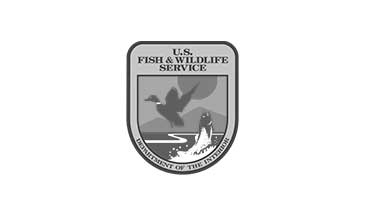Humane Chipmunk Trapping Services
Do you have a chipmunk problem in or around your home? Contact us today to get treatment to get rid of chipmunks on your property!
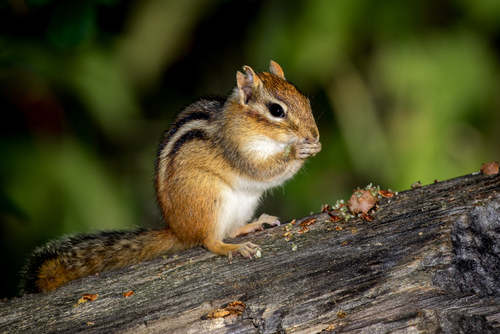
What are chipmunks?
Chipmunks are basically tiny squirrels that have adapted to burrowing. They are small, striped rodents and belong to the family Sciuridae. These rodents can be found in North America and the Siberian chipmunk can be found in Asia. They aren’t picky when it comes to their next meal, but chipmunks primarily eat seeds, acorns, nuts, fruits, plant bulbs, and tubers.
Chipmunks prefer forested areas and can climb trees, shrubs, and bird feeders. They primarily live underground. These little critters hibernate in the winter months by primarily moving within their den.
Chipmunks make a few different sounds including: the chip, the deeper chuck, and the startle call. They also have an alarm sound that warns of danger.
What kind of chipmunks are there?
It may surprise you to find out that there are over 20 species of chipmunks in North America alone. However, the most common types of chipmunks (that you probably see running around your yard and garden) include:
- Eastern Chipmunks
- Least Chipmunks
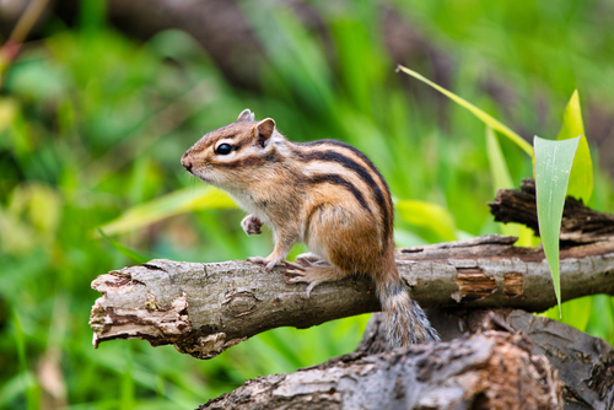
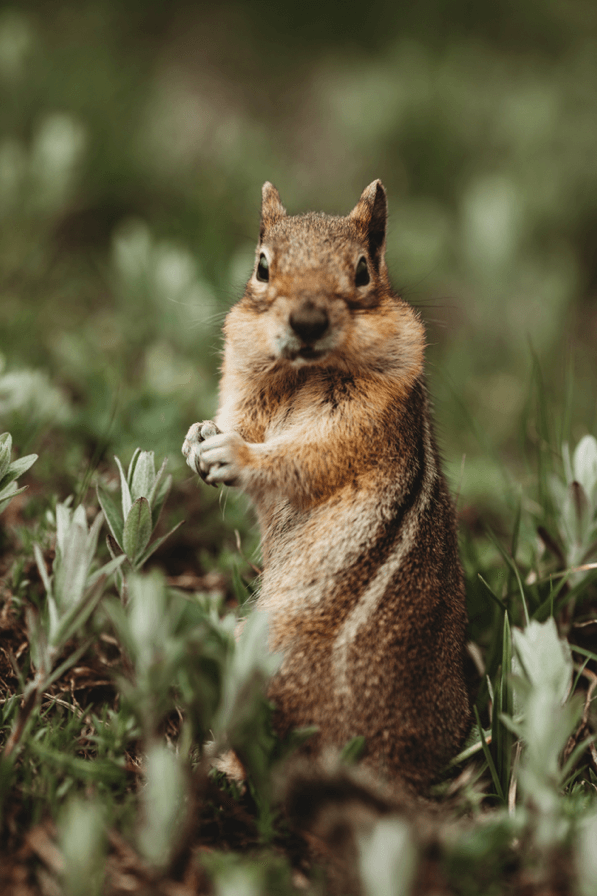
What kind of damage do chipmunks cause?
Damage to the Garden:
Chipmunks often dig up and eat newly planted garden seeds and flower bulbs. Strawberries, plums, apples, and other cultivated fruits are gnawed for their flesh or seeds. Plus, chipmunks commonly dig unsightly burrows in lawns and flower beds for their nests.Damage to Surrounding Property:
These pests can cause costly damage by excavating burrows along building foundations, beneath poured cement porches, patios, paver patios, and walkways. This act will cause gradual collapse of the excavation which leads to the formation of stress cracks in the cement. Most homeowners will see chipmunks in landscaping, in the yard, under the deck, and in sheds.Damage to the Structure:
Furthermore, chipmunks will nest beneath residences, sometimes gaining access inside through utility penetrations and other structural gaps. They may also chew the bottom of the siding to get into the walls. Chipmunks in walls can chew wires, which is just another reason chipmunks need to be kept under control. Occasionally they take up residence in attics or other sites that are distance above ground.How do I prevent chipmunks?
The best way to get and keep chipmunks out of your yard is by getting help from a professional wildlife control company like Varment Guard. However, in the meantime, follow these tips to prevent chipmunks from wreaking havoc in your yard and home:
- Keep your yard clean. Remove any wood or rock piles, trim back plantings, and rake up any fallen fruit or nuts.
- Refrain From Feeding. Feeding chipmunks and coaxing them to approach dwellings and people is a sure way to encourage nesting in nearby trees of the dwelling itself.
- Use a gravel border. Surround your property with a plant-free, gravel border to keep these little guys out.
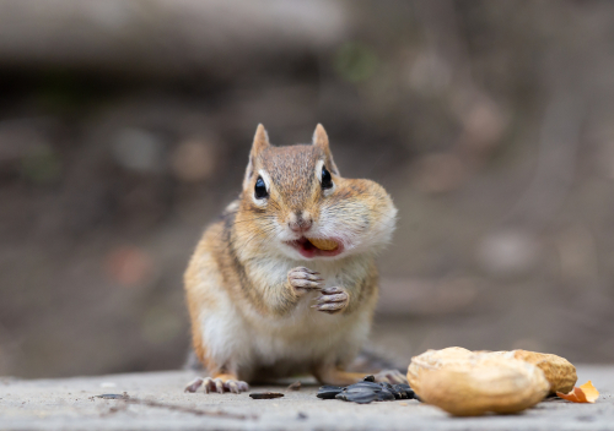

Varment Guard Offers Humane Chipmunk Control
Sometimes, when folks are experiencing a chipmunk problem, they will try and use poisons on them. Do NOT use poison on chipmunks. Chipmunks who consume poison may crawl into a space that is not accessible to humans. This could end up causing a terrible odor—not to mention you could end up with black flies or maggots. Always hire a professional to trap and remove chipmunks from your property, safely and humanely.

If you are having chipmunk problems, or you have a lot of chipmunks digging in your landscaping or yard, schedule a service with Varment Guard today!
How can Varment Guard help with my chipmunk problem?
To get and keep chipmunks away from your property, Varment Guard offers:Live Chipmunk Trapping
Varment Guard technicians set small, live-catch traps along pathways commonly used by chipmunks like porches, decks, sheds, garages, walkways, patios, and concrete slabs.
Although they may not reside and live on the property, chipmunks will utilize flower beds and other mulched areas to search for food. Traps are baited with a variety of things like peanut butter, apples, corn, sunflower seeds, and bird seed.
Chipmunks are unharmed and simply relocated after trapping.
Chipmunk Exclusion
Exclusion is the best method for keeping chipmunks out of buildings and should parallel rodent-proofing measures. Essentially, this involves the closure of all openings that might allow access to buildings along the foundation. Gaps, cracks, and holes will all be sealed. Any utility phone, A/C, heat pump line penetrations must be sealed as well. Crawl space vents will be screened with hardware cloth.
Most walkways, porches, decks, and sunrooms can be excluded with the installation of a buried wire around the perimeter to keep chipmunks and other wildlife out.
Our expert team can quickly and humanely keep pesky wildlife away from your yard and home.
We can rid you of chipmunk problems safely and efficiently!
Frequently Asked Questions:
What do Chipmunks Want?
Chipmunks are always on the look-out for two things: food and shelter. They spend spring and summer stockpiling nuts, berries, seeds, and other foods. When they’re not stockpiling, chipmunks are looking for sheltered, hidden places where they can spend the winter with their food. Read more about chipmunks!
How Did That Chipmunk Get in my House?
Chipmunks may end up in your home while they’re foraging for food. They may accidentally squeeze or fall through gaps in window frames or the foundation, dash through screen doors or even dig into your crawl space. Do you have chipmunks in your home? Learn more about how they got there!
How Can I Keep Chipmunks Out of my Downspouts?
Clear your yard around the downspout as much as possible. Next, make a makeshift vent or filter for your downspouts. However, the best way to keep chipmunks away from your downspout is to keep them away from your home altogether To do so, keep your grass, bushes, plants, and trees well-trimmed.
Do Chipmunks Hibernate?
Chipmunks cannot truly hibernate. Instead, they enter a hibernation-like state of suspended activity called torpor. During this time, their body temperatures and heartbeats decrease and they remain motionless to preserve energy. Torpor is not considered true hibernation, however, because they need to wake from torpor every few days to eat. Learn more about chipmunks and torpor!

